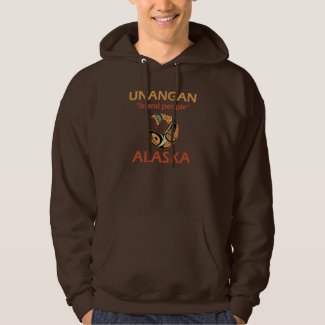The Aleut people (pronounced Ah-loot), who call themselves Unangan (singular, pronounced Uh-nang-an) or Unangax̂(plural), arrived some 5,000 years ago, and settled in loose family groups on the coast and offshore islands of southwest Alaska. They are believed to be the last prehistoric migration of people from Asia.
They are maritime hunters, but also hunt inland. Unangan means "seasider." The Aleut people were all but destroyed by the Russians who exploited the Aleut to further Russian fur enterprises.
The Russians killed approximately 14,000 of the tribe. Ancestors of the survivors are now mostly Russian Orthodox and reside in their aboriginal territories.

Also available in t-shirts
for the whole family
Language: Aleut (Anangax or Unangam Tunuu)
Language Family: Eskimo-Aleut (Eskaleut, Eskaleutian, Eskaleutic, or Inuit–Yupik-Unangan)
Stock: Eskimo-Aleut
Phylum: Aleut
Dialects: Eastern Aleut (Pribilof Aleut, Unalaskan), Western Aleut (Atka, Atkan, Attuan, Unangan, Unangany). Copper Island Aleut is mixed Aleut-Russian language, or pidgin, spoken on Mednyj Island.
Macro-Culture: Alaska Native Village
Population: 2,300 (Dorais 2010)
Number of Fluent Aleut Speakers: 300 (1995 M. Krausse), 150 people in the United States and 500 people in Russia, according to Wikipedia. The Pribilof Islands boast the highest number of active speakers of Aleutian. Most of the Native elders speak Aleut, but it is very rare for an everyday person to speak the language fluently.
Other speakers of the same language: None
Historical Locations: Atka (35), Unalaska (43)
Present Locations: Aleut Corporation in Anchorage, Bristol Bay Native Corporation in Dillingham, Chugach Alaska Corporation in Anchorage and Konaig, Incorporated, in Kodiak
Aleut Tribes:
- Attuan dialect and speaking tribes:
- Sasignan (in Attuan dialect) / Sasxinan (in Eastern dialect) / Sasxinas (in Western dialect) or Near Islanders : in the Near Islands (Attu, Agattu, Semichi).
- Kasakam Unangangis (in Aleut, lit. «Russian Aleut») or Copper Island Aleut : in the Commander Islands of Russian Federation (Bering, Medny).
- ? Qax̂un or Rat Islanders : in the Buldir Island and Rat Islands (Kiska, Amchitka, Semisopochnoi).
- Atkan dialect or Western Aleut or Aliguutax̂ (in Aleut) and speaking tribes:
- Naahmiĝus or Delarof Islanders : in the Delarof Islands (Amatignak) and Andreanof Islands (Tanaga).
- Niiĝuĝis or Andreanof Islanders : in the Andreanof Islands (Kanaga, Adak, Atka, Amlia, Seguam).
- Eastern Aleut dialect and speaking tribes:
- Akuuĝun or Uniiĝun or Islanders of the Four Mountains : in the Islands of Four Mountains (Amukta, Kagamil).
- Qawalangin or Fox Islanders : in the Fox Islands (Umnak, Samalga, western part of Unalaska).
- Qigiiĝun or Krenitzen Islanders : in the Krenitzin Islands (eastern part of Unalaska, Akutan, Akun, Tigalda).
- Qagaan Tayaĝungin or Sanak Islanders : in the Sanak Islands (Unimak, Sanak).
- Taxtamam Tunuu dialect of Belkofski.
- Qaĝiiĝun or Shumigan Islanders : in the Shumagin Islands.
Aleut Historical Timeline:
| Year | History |
|---|---|
| 1741 | Visited by Russians Chirikoff and Bering |
| 1745 | Islands discovered by Russian Nerodchikof |
| 1750 | Russians undertook program of hostage taking, forcing Aleuts to trap for them |
| 1761 | Aleuts decimated a party of Russian traders at Umnak Island |
| 1762 | Aleuts destroyed 5 Russian ships |
| 1766 | Russian Ivan Solovief led an armada against Aleuts, reducing their population by 90%, "a manageable number" |
| 1784 | Aleut Revolt on Amchitka against the Russian traders. |
| 1794 | Russian government interfered protecting natives |
| 1849 | Smallpox epidemic |
| 1942 | During World War II, Japanese forces occupied Attu and Kiska Islands in the western Aleutians. They later transported captive Attu Islanders to Hokkaidō, where they were held as prisoners of war, and all but 25 died. The United States government evacuated hundreds more Aleuts from the western chain and the Pribilofs during WWII, placing them in internment camps in southeast Alaska, where many died. |
| 1988 | The Aleut Restitution Act of 1988 was an attempt by Congress to compensate the survivors of the WWII internment camps. |
